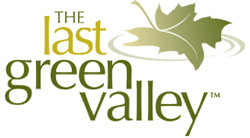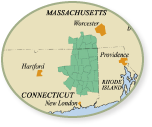
Exploring The Last Green Valley: We must preserve the region’s farmland
What do 18 farms within six towns in The Last Green Valley National Heritage Corridor all have in common? Each has been protected from development by the Connecticut Farmland Trust. The town of Lebanon alone has 12 protected farms, more than any other town in the state.
The Connecticut Farmland Trust is a nonprofit organization working to protect agricultural land since 2002. They have safeguarded more than 3,700 acres of farmland, ensuring it will remain farmland forever. CFT does this by partnering with other organizations within the state to acquire agricultural easements, making sure our prime working lands are available to our state’s farmers for the future.
I first learned about the organization through my friend Dawn Adiletta of Woodstock. She has served on the organization’s board of directors since 2008 and became board president last year. The organization has five staff members and an 18-member board from throughout Connecticut. I spoke with Adiletta to learn more about CFT and the important work they are doing within The Last Green Valley and the greater statewide agricultural community.
“Connecticut Farmland Trust plays an important role in helping preserve family farms, and I’m very proud to be part of that. In June we celebrated the preservation of 50 farms, and are well on our way to celebrating our 60th. Working with landowners, donors and preservation partners, especially the Connecticut Department of Agriculture, we implement our motto ‘protecting working lands for future generations,’” Adiletta said.
“Recently, CFT began managing Connecticut farmlink, which helps retiring farmers and landowners connect with newer farmers. We’re the only statewide land trust that protects agricultural lands, and because we work where the best farmland is, many of our projects have been in The Last Green Valley,” she added.
Adiletta explained that unlike many other land trusts, Connecticut Farmland Trust does not actually own the land. Instead, CFT holds the development easements on the land, providing a valuable alternative to landowners who wish to protect their land. CFT works with other organizations such as local land trusts, government agencies and municipalities to obtain funding for agricultural easements. Here is a description of the easement process from the CFT website, ctfarmland.org:
“Agricultural conservation easements are voluntary, legal agreements that permanently protect farmland by restricting nonagricultural development on the land. The landowner willingly gifts or sells their rights to develop their land for non-agricultural use. Farmers retain ownership of the land, as well as the rights to sell, gift, transfer or lease it. Meanwhile, they can also reap the financial benefits of an easement sale and gain the peace of mind knowing that their farm will never become a subdivision. Easements often allow land to be sold at its ‘use value,’ rather than its ‘fair market value’ or ‘highest and best use value.’ This enables new and expanding farmers to acquire affordable farmland.”
The work of Connecticut Farmland Trust is very important to our region and state. Across the country we are losing farmland at an alarming rate. According to the Farmland Information Center report “Farms Under Threat: The State of America’s Farmland,” between 1992 and 2012 almost 31 million acres of agricultural land was lost to development. Today, the American Farmland Trust estimates 1.5 million acres of farmland and ranchland are lost each year. The stark reality is once the land is converted from farming to developed land — subdivisions and shopping malls — it is gone from viable food production forever.It is estimated 90 percent of New England’s food comes from outside the region, making it even more important that our region’s farmland is protected. To put it simply, preserving farmland is critical to the future and security of our region’s food supply.
The Connecticut Farmland Trust is at the forefront of protecting one of our most valuable resources, and one that will likely become even more important to the future of the state and the region. The Connecticut Farmland Trust, its staff, board and supporters understand keeping land in agriculture helps establish a local, sustainable food system, supports our economy and contributes to improving the quality of land, air and water. Their goal is to make working lands available to Connecticut farmers long into the future, and, for that, we should all be grateful.
Information for this column was gleaned from the websites for the Connecticut Farm Land Trust, The American Farmland Trust, and the Farmland Information Center, farmlandinfo.org. Each of these resources provides pertinent information on the status of farmland loss and protection throughout the country.
We live in a beautiful region called The Last Green Valley, blessed with 77 percent forests, farms and fields. Some of the best farmland in the state is right here. I hope you’ll join me and the many others working together to care for, enjoy and pass it on.
Bill Reid is chief ranger of The Last Green Valley National Heritage Corridor and has lived in the region for more than 35 years. He can be reached at bill@tlgv.org.
Get Connected
Sign up for our newsletter
"*" indicates required fields



